

























































































































Luxury is the difference between the expected and the exquisite. Between a song and a symphony. A work in progress and a work of art.
Coldwell Banker Howard Perry and Walston Global Luxury Specialists are masters of our craft.


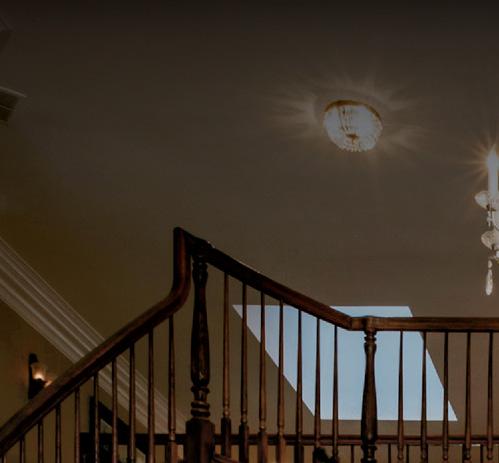
















As the days grow longer and we have a renewed spring in our step, let’s travel to the sun-drenched cliffs of the Amalfi coast where we will lounge under a cerulean blue sky. Imagine warm Mediterranean breezes whisking over the bright sapphire sea, and the sweet scent of orange blossoms weaving through pastel-painted villages. Be sure to take a moment to enjoy the delectable hues of flowering artichoke, pomegranate, and citrus and then meet me in Vietri, and together we will always have a taste of Italy.
Visit us today to experience more than 30,000 square feet of unique furniture, accessories, hand-knotted rugs, and luxurious upholstery. GREENFRONT.COM

 Sofas & Chairs by Rowe, Cabinet by Four Hands, Coffee Table
Art by Wendover, Hand-woven
Sofas & Chairs by Rowe, Cabinet by Four Hands, Coffee Table
Art by Wendover, Hand-woven
OUR TOWN
29LOCALS: Care & Joy Husband-and-wife entrepreneurs Kathryn and Neal Shah

33 DRINK: Sippin’ Cider East Bower Cider Company

35LOCALS: Handy Woman DIY influencer and contractor Brittany Bailey
39MUSIC: Outside Genre Hip-hop artist and filmmaker G. Yamazawa
42NATURE: Roanoke Ramblings Exploring the swamp
47ART: Creative Genius Installation artist Mel Chin
50SIMPLE LIFE: “The Birds of Paradise” Good



Introducing Raleigh’s newest publication!

63 Ice Cream Parlor by Stephen Smith illustration by Marie-Louise Bennett
64Chic Retreat
A fashion-inspired apartment by Ayn-Monique Klahre photography by Catherine Nguyen
70 Color Burst
A visual journey through the WRAL Azalea Gardens in spring by Ayn-Monique Klahre
photography by Juli Leonard
80 Art & Improvisation
Ed Baxter turned dual passions into an encore career by Addie Ladner
photography by Samantha Everette



On Wednesdays, when we have our weekly all-WALTER meeting, I often look around the table and realize that we all match. In fact, I’ll walk into the office on any given day and several of us will be in shades of black, camel or denim, or even less common shades like green, orange or purple. Sometimes, it’s truly uncanny how closely we’re #twinning, from top to bottom, fabric to footwear. We often take a picture and delight in the coincidence.





I think it’s a sign of how synced up we are, especially now that we’re back in the office. We six women have worked together for several years now; the newest person on our team, Addie, is now three years into her job. Laura just hit her fiveyear mark, which I’ll also reach this fall. Julie sold ads in the very first issue in 2012, Cristina started in 2014 and Kait started in 2016. So these days we’re somewhere between coworkers and family, with our own inside jokes and weird traditions. Among them are almost-daily foosball tournaments (alas, I hardly ever win any more), quick afternoon walks to grab coffee or drop off books at the library, Julie’s gourmet brownies on ship day, and surfacing viral videos on YouTube. We borrow things off each others’ desks, sister-style: gum (so much gum), iPhone chargers, corded headphones, a single USB drive for printing things, scissors, multipurpose cleaner and Laura’s lotion that smells like roses.




When I hear about a global trend of people choosing to work remotely instead of going back to the office, my first thought is always, Why? Don’t get me wrong: I appreciate that we have the capability to work seamlessly from home, and I relish my WFH Fridays in my yoga pants. But then I’d miss out on all those connections and quirks that make a job feel like fun.
We had even more fun pulling together this issue than we usually do — keep on reading to see why. A special thank you to all the people outside of the office who worked with us on this; we’re happy to have you as part of the WALTER team this month.


 Ayn-Monique Klahre Editor
Ayn-Monique Klahre Editor






MEYMANDI CONCERT HALL, RALEIGH
FRI/SAT, MAY 1213 | 8PM
Carlos Miguel Prieto, conductor Stella Chen, violin
Your North Carolina Symphony performs Mahler’s thunderous and towering “Titan” Symphony, conducted by Music Director

Designate
Carlos Miguel Prieto. Guest artist Stella Chen joins NCS for Bartók’s mysterious Violin Concerto No 2.

EDITORIAL
Editor
APRIL 2023
AYN-MONIQUE KLAHRE ayn-monique@waltermagazine.com
Creative Director
LAURA PETRIDES WALL laura@waltermagazine.com
Associate Editor ADDIE LADNER addie@waltermagazine.com
Contributing Writers
Catherine Currin, Jim Dodson, Mike Dunn, Ilina Ewen, Hampton Williams Hofer, David Menconi, Liza Roberts, Stephen Smith
Contributing Poetry Editor
Jaki Shelton Green
Contributing Copy Editor
Finn Cohen
Contributing Photographers
Samantha Everett, Juli Leonard, Catherine Nguyen, Matt Ramey, Bryan Regan, Trey Thomas
Contributing Illustrators
Marie-Louise Bennett
Gerry O’Neill
Interns
Nakya Carter
Emma Deal
Jamaul Moore
PUBLISHING
Publisher
DAVID WORONOFF
Advertising Sales Manager
JULIE NICKENS julie@waltermagazine.com
Senior Account Executive & Operations CRISTINA HURLEY cristina@waltermagazine.com
Events Manager
KAIT GORMAN kait@waltermagazine.com
Finance
STEVE ANDERSON
910-693-2497
Distribution JACK BURTON Inquiries?
WALTER OFFICE
984-286-0928
Address all correspondence to: WALTER magazine, 421 Fayetteville Street, Suite 104 Raleigh, N.C. 27601
WALTER is available by paid subscriptions for $25 a year in the United States, as well as select rack and advertiser locations throughout the Triangle. Subscribe online at waltermagazine.com/subscribe
For customer service inquiries, please email us at customerservice@waltermagazine.com or call 818-286-3118.
WALTER does not accept unsolicited manuscripts.
Please contact Ayn-Monique Klahre at ayn-monique@waltermagazine.com for freelance guidelines.
Owners
JACK ANDREWS, FRANK DANIELS III, LEE DIRKS, DAVID WORONOFF In memoriam FRANK DANIELS JR.
© WALTER magazine. All rights reserved. No part of this publication may be reproduced in any form without the express written consent of the copyright owner. Published 12 times a year by The Pilot LLC.







Juli Leonard has been a photojournalist for over 20 years. She enjoys working on long-term projects and getting to know people. Leonard lives in Raleigh with her daughter, partner, two rescue dogs and three Guinea pigs. “Each time I walk into the WRAL Azalea Gardens, they amaze me. They are tucked away like a treasure on the way into downtown. This was my first time to photograph the gardens and — as is always the case with an assignment — visiting as a photographer allowed me to take in the details with more careful consideration and awe.”


Ilina Ewen considers herself an “accidental activist” who advocates for issues like reducing childhood hunger, eliminating child abuse, supporting public education and increasing representation of women in the workplace. She uses her voice as a public speaker and writer who talks about advocacy, family engagement and social justice. “Interviewing Brittany intersected many touchpoints for me. She is a powerhouse in her field, a champion for social good and a fellow mom to boys. I approached this story through the lens my career gives me, of a woman who works for a commercial general contractor. Brittany’s skills and outlook serve as a lesson and inspiration to me personally and professionally.”
Samantha Everette is a portrait photographer and Durham native. She graduated summa cum laude from North Carolina State University with a bachelor’s degree in industrial design. Everette spent a decade in New York as a footwear designer and has since returned home to explore her passion for photography. For this issue, she photographed artist Ed Baxter and the Dreamville music festival. “What an amazing experience — I was so excited about Dreamville that I could barely sleep that weekend.”


Longtime music writer David Menconi first interviewed the Durhamborn rapper G. Yamazawa in 2017, when his song “North Cack” was blowing up. “You’ve got to love any song that hypes Carolina barbecue,” says Menconi. His next book, Oh, Didn’t They Ramble: Rounder Records and the Transformation of American Roots Music, will be published by University of North Carolina Press in the fall of 2023.
 courtesy contributors
courtesy contributors
We love to hear from you! A few recent notes...

“A legend in a league of her own! So proud of Coach Jones and honored to have played tennis under her guidance.”
— Vance Denning“Thank you so much for the article on Charles Frazier! I was wondering how he wrote his way through the pandemic. I’m excited to read how he made magic again.
 — Jim Lamberson
— Jim Lamberson
“Every Friday, I look forward to my email from WALTER. This week was chock-full of interesting pieces. But the “Real Magic” teaser hooked me and reeled me. Intrigued by magic since a child, I devoured the article. I learned something new yesterday, and now I’ll be heading to Clayton to catch a show. Thanks for the enlightenment.”
— Spencer Meymandi“Water Warriors absolutely does justice to the majesty of these creatures and the important work that we are trying to do to conserve them.”
 — Eric Teitsworth
— Eric Teitsworth






April 1 & 2 | All day
Dorothea Dix Park will transform into Dreamville again this year, marking the third installment of the celebrated music and cultural festival from producer, rapper and North Carolina native J. Cole. This year’s headliners include Usher, Drake and Cole himself. The lineup includes more than 20 acts from artists like Caribbean-influenced rapper Sean Paul; Nigerian singer, rapper and songwriter Victony; and City Girls, a hip-hop duo from Florida. Last year, Dreamville drew more than 80,000 attendees and generated more than $6 million in revenue for Raleigh and Wake County. Proceeds from the festival will also benefit local youth through Cole’s organization, Dreamville Foundation, as well as the Dix Park Conservancy. From $250; 2105 Umstead Drive; dreamvillefest.com

April 1 - 8 | 9 a.m. to 6 p.m.
Stop by the NC State Fairgrounds’ Flower and Garden area for the Gardeners of Wake County’s annual Azalea Sale. There, you’ll find hundreds of varieties of the popular flowering bushes, including hard-to-find ones. The proceeds support scholarship grants for North Carolina State University horticulture students. “Our club was founded to spread good gardening practices as well as enhance the beauty of Wake County,” says club president Tom Packer, noting that they’ve been able to raise between $10,000 to $20,000 in past years. “We are especially proud of the financial support we are able to offer NC State students in the Horticultural Sciences program.” One variety in particular — the Wolfpack Red, a traditional azalea developed by a horticulturist at NC State — is particularly popular. Get there early — they often sell out! “We will exhibit about 120 varieties of azaleas, the most in the Triangle, including about 80 varieties of single-blooming classic evergreens, 24 Encore multiblooming varieties, six varieties of Perfecto Mundo multiblooming varieties and 14 varieties of deciduous azaleas, all NCgrown and in a variety of colors and bloom designs,” says Charlie Leverett, who chairs the sale. Free admission & parking; Gate 6 off Youth Center Drive, NC State Fairgrounds, 4285 Trinity Road; gardenersofwakecounty.weebly.com
April 1 | 4 p.m.
Paperhand Puppet Intervention will join the North Carolina Symphony to perform French composer CharlesCamille Saint-Saëns’ Carnival of the Animals. Conductor Michelle Di Russo is looking forward to this year’s installment of the tradition. “It’s a beautiful piece and the puppets bring to life the







APRIL 1–AUGUST 6, 2023
TICKETS
ncartmuseum.org/afrofuturism
Free for ages 21 and under and college students
FROM SKETCHBOOK TO BIG SCREEN … Academy Award–winning costume designer Ruth E. Carter has added dimensionality, flair, and culture to iconic movies such as Do the Right Thing and Black Panther, creating original, magical garments that have defined generations.

different animals represented in the music,” says Di Russo. “Between the visual elements, narrative and music itself, it’s a great opportunity for children to really engage with the symphony. It will be a lot of fun!” The performance is sponsored by WakeMed Children’s Hospital, and guests are encouraged to bring their favorite plush animal for checkups at the Teddy Bear Clinic beforehand. From $29; 2 E. South Street; ncsymphony.org
April 2 | 3 p.m.

Cheer on the Raleigh Firebirds basketball team in their sixth game of the season against the Charlotte Purple Jackets. Community groups including local YMCA branches, parishes and youth clubs like Boys & Girls Club and Girl Scouts will be honored for their contributions to the Raleigh public on this Family and Friends Day. From $18; Word of God Christian Academy, 3000 Rock Quarry Road, raleighfirebirds.net
April 5 | 6 - 9 p.m.
Join WALTER for an evening of food and storytelling to celebrate the book Italy on a Plate: Travels, Memories, Menus by Susan Gravely, the founder of VIETRI homeware. She’ll be in conversation with her best friend, Frances Mayes, another local Italiophile and author. In addition to wine pairings and heavy hors d’oeuvres from Alimentari at Left Bank, enjoy a handmade pasta demonstration, Q&A with Gravely and Mayes, and book signing. From $65; Transfer Co. Food Hall, 500 E. Davie Street, waltermagazine.com/savethedate
April 5 - 16 | Various times Jersey Boys is a Tony Award-winning show inspired by the true story of the 1960s rock band The Four Seasons — catch it at Theatre Raleigh this month. It follows a group of friends in New Jersey who evolve into a hugely popular band and the challenges that ensue. The cast
April 7 | 7 p.m.

If you’re a fan of intimate storytelling series like The Moth, consider this live, local opportunity to immerse yourself in another world. Born in 2015, 7 Stories was the brainchild of three friends, Eric Mack, Brad Habeeb and Justin Scranton, who found themselves swapping stories at all hours of the night. Realizing the power of a good story, the trio made their ritual a monthly Sunday community event. “It was amazing to watch as 7 Stories became this outing for so many people,” says Scranton. “Over its five-year run, we tackled themes ranging from mental illness to the time before cell phones.” After a four-year hiatus, 7 Stories returns to its original home, Kings, on April 7 with seven Raleigh residents sharing their own tales of strength and rebirth along the theme of “Comeback.” “From bringing a beloved restaurant back to life to recovering from a tragic injury, each story will be compelling and different,” says Scranton. Cash entrance only; doors open at 6:30 and around 100 people will be allowed in. $12 at the door; 14 W. Martin Street; 7-stories.com
includes Broadway actor and singer Rob Marnell, who grew up in Raleigh, playing Four Seasons’ keyboardist Bob Gaudio. Marnell graduated from Elon University and has dubbed this show a “homecoming performance dedicated to all of the North Carolina teachers who inspired and ignited my passion for the arts.” From $35; 6638 Old Wake Forest Road; theatreraleigh.com


April 8 | 5 - 10 p.m.
In Japanese, Sakura means “cherry blossom,” which originated from the word “saku,” or “to bloom.” Inspired by these fleeting flowers, the Japanese tradition of the Sakura Festival is a time to gather with food, music and companionship. Warehouse District restaurant O-Ku will mark the tradition with special menu items, many with a pink hue. “We have hamachi flown in daily from Japan that we’ll serve with a blood-orange vinaigrette, along with other specialities like sweet shrimp, Japanese sea bream and beet-cured salmon,” says O-ku chef
Cuong Le. There will also be cocktails featuring flowers, including the First Bloom, a tangy concoction made with gin, Luxardo cherries, lemon, orange blossom water and Mancino Sakura Vermouth. $50 per person for prix-fixe menu (April 6 only); reservations recommended; 411 W. Hargett Street; o-kusushi.com
April 8 | 10 - 11 a.m.
Raleigh City Farm will host a workshop where you can learn how to make your own herbarium and turn fresh botanicals picked from the farm into art that lasts forever. The farm’s artistin-residence, Julia Einstein, will lead the class along with a walk through the garden to identify what’s in season this month. All supplies included. $10; 800 N. Blount Street; raleighcityfarm.org
April 15 | 8 p.m.
Head to Stewart Theater for the grand
finale of NC State Live’s 50th anniversary season: the performance of Home, Migrations, and Our Imaginary Daughter, an allnew piece of work by violinist and composer Daniel Bernard Roumain. The piece was commissioned by NC State Live and features a libretto by Haitian-American poet Kaitlyn Boyer. Along with other songs from Black composers across three centuries, the piece will be performed by the Raleigh Civic Symphony and DBR, along with special guests: spoken-word artist Bernadette Allen, violinist Felicia Adizue, cellist Tristen Johnson, cellist Shana Tucker and United Strings of Color. Associate director Liza Green says that this performance feels like a full-circle moment. “This is Daniel’s seventh appearance with us, and he’s always eager to engage creatively with other artists,” says Green. “We’re honored to end this special year with an inspired concert.” Free; 2610 Cates Avenue; live.arts.ncsu.edu



You may not have heard of Ursula Parrott, but writer and filmmaker Marsha Gordon is out to change that. In the Golden Age, Parrott was known for her controversial writing about the challenges of being a woman, mother, wife and writer. “She was publicly open and frank about her life at a time when it was risky,” says Gordon. This month, Gordon will publish a biography of Parrott, Becoming the Ex-Wife, which offers an in-depth look at Parrott’s complicated and sometimes scandalous life. It coincides with the May republishing of Ex-Wife, Parrott’s 1929 best-seller, which was originally published anonymously. On April 26, join Gordon and fellow writer Tift Merritt at the Cary Theatre for a screening of The Divorcee, a 1930s film inspired by Parrott’s writing. Gordon and Merritt will lead a panel discussion following the film. From $4; 122 E. Chatham Street; thecarytheater.com





April 15 | 12 - 6 p.m.
Head downtown for barbecue joint
The Pit’s 13th annual ‘Cuegrass Festival, a celebration of North Carolina barbecue and bluegrass music. Hear from eight regional acts including roots band Old Habits and jazz group Duck on the main stage at the north end of Fayetteville Street, as well as soul musician Eliza Meyer and acoustic group the Brewer Brothers on the Beer and Banjos stage on W. Hargett Street. Kids and dogs welcome. The festival is free to attend but proceeds from beer and food purchases will be donated to SAFEchild’s Champion Our Children campaign, the Junior League of Raleigh’s BackPack Buddies and Occoneechee Council. Free admission; Fayetteville Street; cuegrass.com
April 22 - 30 | 2 & 7:30 p.m.
See the musical adaptation of Alice Walker’s historic Pulitzer Prize-winning novel The Color Purple, which tells the famous harrowing story of Celie, a Black woman in the rural South who faces sickening abuse and racism. But with fortitude and love, she endures. Gospel, jazz and blues music support this story about the power of women sticking together in the face of adversity. See it unfold on stage at the newly renamed Martin Marietta Center for Performing Arts. From $23.67; 2 E. South Street; nctheatre.com
April 22 | 8 a.m. - 12:30 p.m.
Lace up your sneakers for the 2023 Walk/Run/Bike for Umstead, which includes a 4-mile walk or run, bike tour, silent auction, kids’ activities, music and food trucks. Cheer on your runner with breakfast from food trucks Buzzy Bakes and Vida Dulce. Along the trails, the Saint Francis Brass Quintet and Woodland Pipers will be supporting the walkers and runners with their sounds. Throughout the event, bid on silent-auction items from local artists, restaurants and shops. Funds
DRI has provided state-of-the-art imaging services for nearly 40 years. Now in the Raleigh area, we hope you will let us care for you and your family. We offer immediate appointments and exceptional care in a beautiful, comfortable environment.




Hours: Monday–Friday, 8am to 5pm DR



raised from the day will go towards the William B. Umstead State Park, which offers more than 5,000 acres of waterways and trails. From $20 for kids, $30 for adults; 6000 Reedy Creek Road; umsteadcoalition.org
April 22 | 10 a.m. - 6 p.m.
Celebrate the talent of North Carolina Indigenous artists at the North Carolina Museum of Art this month. Throughout the day, take part in a variety of art activities and demonstrations including basket making, nature journaling and metal working. Lumbee youth dancers from the Pembroke Boys & Girls Club will give a traditional dance performance. In addition, Nancy Strickland Fields, the director of the Museum of the Southeast American Indian in Pembroke, will moderate a panel discussion on the history and
craft of Indigenous art. The day will close with a concert by North Carolina Indigenous musicians. Free; 2110 Blue Ridge Road; ncartmuseum.org
April 22 | 5 - 10 p.m.
Celebrate Earth Day weekend at Dorothea Dix Park at a community event in Flowers Field. Learn about local conservation with organizations like Carolinas Wetland Association and Wake County Beekeepers Association, play nature games with the kids and dine on dishes from food trucks like hibachi from Soulbachi, sweets from Kupkake Fairy and Mediterranean food from Gussy’s Greek. At 6:30 p.m., the City of Raleigh will be presenting its Environmental Awards and at 8:15, spread your picnic blanket and lawn chairs out for a screening of WALL-E Free admission; 1030 Richardson Drive; dixpark.org
April 29 |
10 a.m. - 3 p.m.
JC Raulston Arboretum is aflower this month with its annual family-friendly festival. Head to the public garden for an array of nature-inspired activities, along with plant and book sales. Young bird watchers will particularly love checking out the entries in the 20th Annual Birdhouse Competition, along with earth-friendly crafts. Enjoy snacks from food trucks like Arepa Culture NC, Hollywood Taco Shop and Howling Cow. Adult gardeners can attend lectures by floral experts, including a talk from HortTube’s Jim Putnam about “Proven & Potential Power Plants” or a session on “Success with Houseplants” with Shawna Jopin of Dirtbag Gardens nursery in Chapel Hill. From $5; 4415 Beryl Road; jcra.ncsu.edu.
GARDEN SHOP I CAFE
GIFT SHOP I GREENHOUSE
Custom orchid arrangements & houseplant care. Come visit our greenhouse or let us come to you.





707 SEMART DR I RALEIGH I 27604 at Seaboard Station until 2025 919-828-5337 I LOGANTRD.COM FOLLOW US: @LOGANTRD












 Brandon McCraney, Olde Raleigh Distillery
Brandon McCraney, Olde Raleigh Distillery
















When Kathryn Shah was diagnosed with triple-negative breast cancer at 35 years old, she embarked on an aggressive 28 weeks of chemotherapy and radiation. With her corporate career on hold and her future uncertain, her focus shifted to the pursuit of health, to the thought of what she might do with the gift of time.

“I was going to do the things the doctors told me to do,” says Kathryn, who believes in a combination of Eastern and Western medicine, “but I also wanted to think about how I could make changes in my own way of living — through things like meditating, sweating and eating recommended foods — to improve the outcome of chemotherapy.” During treatment,
that meant adding a long list of foods to her diet, including red grapes, leafy greens and matcha. Diligently following the clinical evidence supporting foods high in antioxidants, Kathryn didn’t have any room left for refined sugars.
During her battle, people sent food to her home in New York City. As they do. Boxes arrived with tall cakes and cookies decorated in all manner of refined sugars and dyes: all wellmeaning treats, but she ate none of them.
Kathryn found herself in a similar situation the first holiday season after chemo: gathered with family around tables full of thick apple tarts and whipped-cream-topped pumpkin pies. They didn’t fit with her health ethos. “I wanted to celebrate, to enjoy something that felt like a treat but was still nourishing
me,” she says. Kathryn had a business school degree, eight years’ experience in marketing, and now, during her recovery, time to think. “I wondered, why is there nothing on the market that feels cool and chic, but people also want to eat because it tastes good? ” she says.
Shortly thereafter, Kathryn and her husband Neal, who’s originally from Charlotte and went to the University of North Carolina at Chapel Hill, relocated to Raleigh. There, an acquaintance introduced Kathryn to Sarah Bell, the former head of soft product development for Harry’s Grooming. Bell also had an affinity for wellness and a passion for nourishing her friends and family with real, natural foods.
Together, the duo founded Spring & Mulberry, which produces treats that are naturally derived, globally sourced and packed with real nutrition. Kathryn and Bell logged countless hours in the kitchen perfecting their prototypes: rich chocolate bars made without refined sugars, but getting depth and sweetness from dates — an ingredient Kathryn first encountered as a dessert in Dubai en route to visit her husband’s family in India. Spring & Mul-

berry uses organic cacao beans directly from a cooperative in Suhum, Ghana, the country’s first biodynamic and organic farming region. The Suhum cacao beans are packed with iron and boost chemicals like serotonin and tryptophan, which are associated with well-being and happiness. The beans become a bar with just the cacao butter and dates.
From there, Kathryn and Bell use fruits and spices to vary their offerings. Some chocolates are topped with goji berries, which have been used for thousands of years to slow the signs of aging. They use nigella seeds, an ingredient shown to reduce inflammation that’s mentioned in the Old Testament and was discovered in King Tutankhamun’s tomb. They mix in mango, chili, black lime, lavender, bee pollen and rose petals. “The idea behind Spring & Mulberry is exploring a world of sweetness beyond sugar, in florals, spices and fruits,” says Kathryn. “I want to make our chocolate so delicious that you don’t even remember or care about the products that do have sugar.”

Mixing Kathryn’s background in marketing with Bell’s experience in product development

“I thought there has to be a way to create something you’d want to buy yourself and others that’s beautiful and delicious, but also nourishing.”
— Kathryn Shahcourtesy Spring & Mulberry (CO-FOUNDERS, CHOCOLATE BAR) Spring & Mulberry co-founders Sarah Bell (left) and Kathryn Shah.
has proven a prime recipe: Spring & Mulberry isn’t just delicious, it’s a cool brand, from the signature font on the packaging to the sunset-inspired color scheme. They launched in March of 2022 and sold out by Mother’s Day. Then they scaled up: over the next few months, Kathryn and Bell messaged social media accounts of independent groceries and lifestyle boutiques around the country, 200 of whom now stock Spring & Mulberry’s chocolate bars.
“Food gifts are the most popular gift, but most are filled with sugar, additives and dyes. I thought there has to be a way to create something you’d want to buy yourself and others that’s beautiful and delicious, but also nourishing,” says Kathryn. She and Bell still pack and ship everything themselves in stamped boxes with purple tape emblazoned with mulberry trees. In the last three months of 2022, their Raleigh-based business grew 325%. Their bars have caught the attention of Goop, Forbes and Vogue magazines among others.
The name Spring & Mulberry comes from an intersection in New York City, the spot where Kathryn and Neal would meet for dinner dates before they were married. And it turns out that Kathryn’s cancer also set Neal on a path to creating something new based on a need her battle uncovered.
When Kathryn started her chemotherapy, he left a successful private equity job on Wall Street to be the primary caregiver. “Suddenly I was helping her with personal care, taking her to appointments, doing everything around the house. I was 35, at the peak of my career, feeling invincible, and then it hit,” Neal says. “It was eye-opening, and there was an emotional toll.”
During the arduous years of chemotherapy, hospitalization, radiation and surgeries that followed, Neal kept noticing something: “So many people were navigating aging and serious illness care without support, without someone to lean on or provide respite. They needed a convenient way to find great caregivers to help them. I saw a massive problem matched with a tremendous business opportunity and I became obsessed with designing a better solution.”
By the time the Shahs moved to Raleigh, Kathryn was in recovery — and Neal realized the area would be an ideal spot for a health-tech startup. He reconnected with a former professor at UNC, who introduced him to a recent computer science graduate, Gavry Eshet, who had software development skills and an understanding of the student population that could serve as caregivers. So while Kathryn was growing

Spring & Mulberry in their kitchen, Neal was bent over his laptop at Jubala Coffee, working on the prototypes of what is now the fastest-growing health-tech startup in North Carolina: CareYaya. The company pairs pre-health-career college students with families in need of home care for a loved one. It’s an online marketplace in the vein of Uber, Airbnb or DoorDash.
So many family caregivers are of the “sandwich generation,” ones who juggle childcare and careers, and now care for a sick spouse or aging parent. “They’re the unsung heroes in our society,” Neal says, of the 53 million Americans caring for a loved one, often at great personal sacrifice. He and Eshet launched the pilot program at UNC Chapel Hill, then took it to North Carolina State University, and on to Duke University. The students they employ, motivated by a genuine desire to help families, provide companionship to the elderly, to spouses with serious illness, or to children with special needs. They log clinical hours in caregiving and earn well above minimum wage: families pay $15 to $18 per hour (a fraction of what most in-home care costs), all of which goes directly to the students.
But the best part of the whole arrangement isn’t the ease of scheduling or the affordability, it’s the connections that are built. Josh, a pre-med NC State student, spends his Thursdays strolling alongside a man living with Parkinson’s named Joe, who pushes a walker and tells stories of the Vietnam War. McKenna, a student at UNC, flips through photo albums with
Raymond, who has dementia; his wife has organized her work schedule around McKenna’s classes to offer her husband continual care. Ashlyn, a senior pre-med student at UNC last year, had learned metronome therapy, a way of moving her hands to the rhythm of a metronome at forty beats per minute, after her own brain injury. She taught the method to Jim, whose spirits and mental acuity soared. (Ashlyn is now enrolled at UNC’s School of Medicine, and she is still friends with Jim.) Kelsey, a pre-physician’s assistant student at Elon University, cares for a local resident named Marjorie, who suffers from dementia. When Kelsey bakes cupcakes at her dorm, she often drives over to drop some off for Marjorie.
Some clients call them “joygivers” or “grandkids-on-demand,” and there are now 2,000 of them serving 800 families across the Triangle. “We’re unlocking a massive hidden workforce, one that we can get all over the country” says Neal. “We aim to build a unicorn in health tech, one that trains the healthcare workforce of tomorrow and helps millions of people along the way.” Parents of the students on CareYaya have been so moved by their children’s experiences that they’ve been posting personal stories on Facebook, inspiring other parents to have their children sign up. “The market opportunity to build a better care system is the biggest in health tech — and we’re just getting started,” says Neal.












Yaya sounds fun — but it also means caregiver in Swahili, grandmother in Greek and represents self-directed care with the acronym You Are Your Advocate. “I went through hundreds of name ideas,” says Neal. “I was running them by Kathryn and when I got to CareYaya, she stopped me and said that’s the one.” (He’s offered his opinions to her, too, as an early taste-tester of Spring & Mulberry’s creations.)

Kathryn and Neal still often sit with their laptops at the kitchen table late into the night, their startups no longer fledglings, but their senses of purpose just as strong. During her cancer treatment, Kathryn’s oncologist had suggested she take an injection that would stop her reproductive hormone, having potential preventative benefits for cancer, but voiding any chance of having children. In a chemo fog, she agreed, but in the moments before the nurse arrived with the injection, Neal suggested she take some time to think.
“This split-second medical decision could have changed our lives, and I am glad I was there so we could make an informed decision during an intense time,” says Neal. Kathryn is now cancer-free, and today their family includes a little girl, Penelope, who arrived in 2021. “You realize how short life can be,” says Neal. “We had those years of health-related focus, and now we’re making up for lost time.”
Tucked just off Whitaker Mill Road in the new East End Market, a development with food, drink and entertainment, you’ll find bright, punchy ciders inside a refuge of greenery and good vibes. East Bower Cider Company was founded by friends Dustin Walker and Oliver Koch, who together have decades of experience in the beverage industry. The two met as bartenders in Athens, Georgia, and

later crossed paths when they worked as regional beer reps for Terrapin. Eventually, they both landed in Raleigh and started talking about opening up their own place.

That didn’t turn into a concrete plan until a visit to a cidery six years ago. “We tasted some amazing ciders — the kind that aren’t like sugar bombs,” says Walker. “As beer reps, we didn’t typically lean into cider, but we figured we could do this.”

During quarantine, Walker taught himself to brew cider through online classes at the Cider Institute of North America (CINA). He took a few courses on the basics, tested different recipes and learned the techniques. “I made some at-home batches to test it out,” he says. “I didn’t have brewing experience, but with my time in the beer industry, I wasn’t going in blind. I understand flavor profiles and know what people enjoy.”

While Walker focused on brewing delicious and approachable cider, Koch took the reins on planning the front of house operations. The two credit the folks at Trophy Brewing for supporting their endeavors — they allowed Walker to shadow the brewing team to learn more on the process, and Koch gained experience running a business while managing at State of Beer for several years. The efforts turned into East Bower Cider Company, Raleigh’s first cidery. “It was great to share the lessons we have learned with Dustin and Oliver and possibly help them avoid some of the mistakes we have made,” says Chris Powers, co-owner at Trophy Brewing. “Working together, plus being friends with each other and our families, makes their success that much more important to us. And if we can enjoy a great locally made cider at the same time, it’s a win for all of us.”
Today, Walker’s the head brewer for East Bower, batching up everything from mainstays like the Queen Bee — a semidry cider sweetened with a hint of local honey — to funky flavors that incorporate ingredients like habanero peppers. “While the process is quite
similar to beer, cider is more of an agricultural product, grown rather than brewed,” Walker says. “Naturally sweetened ciders — as opposed to those with added sugar — are akin to a dry, slightly fizzy wine.”

East Bower sources local as much as possible, including the blueberries and strawberries to make their Jam On cider. Each brew takes on the flavor profile of its added ingredients — a bite from fresh ginger or a lingering sweetness from mango or honey. At the cidery, you can try a flight to taste a sampling of four flavors or grab a growler to take home. You can also find East Bower on draft at spots like Poole’side Pies, State of Beer and Raleigh Beer Garden.
Koch is the mastermind behind the space’s calming aesthetic, which is filled with natural wood and lots of live plants. The green space is inspired by the name. “A bower is a shaded spot in a garden, and the ‘East’ is obviously a nod to our location,” says Walker. “We wanted to create a space that was visually pleasing but had a different feel than a traditional brewery.”
The outdoor patio is a highlight of the
You don’t have to just drink cider by itself — mixing it with other herbs, juices or liqueurs can play up different elements of its flavor and make the drink more or less alcoholic.
“In this drink, the sweet vermouth adds an herbal sweet note to the dry cider,” says Koch. “The orange and ginger highlight the whole drink and make it refreshing and bright.”
2 ounces Baranano Vermouth
3 dashes Crude Bitters Tiki Bitters
6 ounces East Bower Cider Company Wild Ride Dry Cider
DIRECTIONS
Mix ingredients and serve over ice. Garnish with a slice of orange and a piece of candy ginger.

space, with a sprawling lawn scattered with fire pits, seating and, on weekends, a food truck parked front and center. Guests can also bring their own food to enjoy with a beverage; children and dogs are encouraged, too.
Koch and Walker feel there’s something for everyone to drink at East Bower. In addition to cider, they offer a carefully selected beer and wine list, and cocktails made with cider.
But the two hope you’ll at least have a taste of their craft in its pure form. “That’s the best part,” Walker says. “Our favorite customer is the one where we can change their mind on what cider can be.”
 by ILINA EWEN
photography by TAYLOR MCDONALD
by ILINA EWEN
photography by TAYLOR MCDONALD
At just 8 years old in her home in Virginia, Brittany Bailey helped her dad rewire a socket — something new for both of them. “My dad wasn’t discouraged because he didn’t know how to do it, he just took an electrical class,” she says. “That mentality, that I can learn anything, stuck with me.” Today, Bailey is a Raleigh-based general contractor and DIY influencer who reaches about 500,000 people a month through her website, YouTube and social media as Pretty Handy Girl.
The electrical project was not the first, or biggest, project that she’d helped her parents with. A few years earlier, her parents had embarked upon an ambitious home renovation to make room for their growing family: adding a second story, among other improvements. Neither of her parents were contractors, “but they shared the we’ll-just-figure-it-out spirit and embraced the DIY life,” says Bailey.
Over the course of about two years, her parents did most of the work themselves, all while living in the home with two young daughters (and one on the way). The undertaking was eventful even beyond the typical pitfalls of such a big project. Partway through construction, for example, the second-story addition roof collapsed during a snowstorm, the debris just missing young Bailey. “I remember saying, Mom, the sky is falling!” says Bailey. She recalls her mother, several months pregnant, standing on a two-story extension ladder spackling and drywalling: “It was a sight to behold.” Her parents encouraged their girls to learn and help alongside them. “I come from a family of people who don’t like to be told what to do, and I was raised to believe I could do anything,” she says.
That spirit stuck with her. Bailey is the sort who considers painting a bedroom the perfect date-night activity: “You’re confined to one room and just talk!” She earned a BFA in illus-
tration and a minor in art therapy from the University of the Arts in Philadelphia, then worked as a graphic designer. Bailey settled in Raleigh in 2001 with her husband and ran her own graphic design business. But she was always tinkering, fixing things and building things. Unlike many of the couples they knew, “I was always the handy one, fixing toilets and everything else,” she says. “I’ve never asked for jewelry for gifts. I want power tools.”
This dynamic made her want to empower other women to take on DIY projects. One time, Bailey was building storage for a friend’s mudroom; the friend suggested she start a business teaching workshops to women on how to use power tools and fix things around the house. Excited about this new venture, she told her husband her plans. “He completely squashed my idea — because he thought I could reach more people with a blog,” Bailey says. “I literally started the next day.”
That was 2010, a time when blogging was relatively new, and “mommy blogs” were garnering all the attention, not gritty DIY content. But Bailey found a small but growing community of women who were sharing tips on framing and other construction endeavors. She shared what she knew on her blog,

then on YouTube; now she has more than 2,000 tutorial videos online. Her how-tos range from fixing wood rot to sewing to using reclaimed wood to build a barn door. And she had a full-circle moment with those early DIY memories when, at eight months pregnant with her second son, she squeezed into a tub alongside the plumber to fix a leak — and her water broke.




Today, running Pretty Handy Girl is a full-time job. Bailey empowers her followers, most of them women, to use power tools and do home projects themselves. “I am so passionate about sharing content and teaching people skills,” she says. “I’ve found a lot of people like me who are DIYers and interested in learning to do things.”
One pivotal Pretty Handy Girl project started as a cosmetic kitchen remodel. But peeling back old tile uncovered layers of subfloor water damage and mold. So she pulled on her steeltoed Chelsea work boots, rolled up her sleeves and gutted the kitchen. “We went from having a kitchen to having no kitchen,” says Bailey. She filed for permits and managed the plumbers, electricians and other tradespeople who helped her finish the project. And that project launched the next phase of her DIY identity, as a general contractor.



“I’ve never asked for jewelry for gifts. I want power tools.”
Brittany Bailey
The City of Raleigh building inspector who signed off on the remodel planted the seed. “He said to me, There aren’t enough women in this business, and you’d make a great GC,” says Bailey. (In North Carolina, only 4% of general contractors are women.) By 2016, she earned her license, and since then, she has taken on full-home renovations. “Being a GC meant I could start investing in real estate and do the work myself,” Bailey says. “I knew what it entailed and I knew I could do it.”

She chronicled one such renovation in an online series called “Saving Etta.” Bailey bought the circa-1900 Allen House on S. Person Street to rehabilitate it and avoid potential demolition. Once again, she hoped to just make minor updates, but surprises sprung up: piecemeal additions to untangle, black mold and a roof that was improperly installed. “It became quickly apparent that this would be beyond cosmetic. The plumber I hired joked that he had matches in the truck,” she laughs. But Bailey was undeterred.
“I called in an architect, Meg McLaurin, who basically said we need to tear off all the additions,” Bailey says. “That gave me permission to just say yes, let’s do it.” Most of Bailey’s subcontractors had never worked with a female general contractor before. “I hired the ones who showed me respect as the GC on the project and didn’t speak to me like I was inferior,” she says. “My subs were my cheerleaders and teachers and wanted to see me succeed. They saw my vision and ran with it.”
In the end, Bailey managed to save most of the home’s original footprint and added on another 1,600 square feet. “I was learning every step of the process,” she says. “Had I known how much work it would be, I wouldn’t have bought the house. I owe so much to my subs for making sure I got to the finish line.”



“Brittany likes to do things the right way — she’s not afraid of something new and will learn either how to do the job correctly herself or sub it out,” says electrician Harvey Washington of JBW Electric, who worked with Bailey on the project. “Brittany doesn’t let being a woman in a male-dominant trade bother her because at the end of the day, her work speaks loud and clear.”



George “G.” Yamazawa has always been hard to pin down, perhaps because multitasking comes naturally to him. A 32-year-old Durham native, he first found himself onstage as a teenage poet, winning the Bull City Slam championship in 2009. Five years after that, he was winning national poetry competitions and taking his first steps as a hip-hop artist, releasing his first mixtape, “23” (his age at the time).
Nine years and multiple albums, singles and videos later, Yamazawa is expanding yet again, this time into filmmaking. His first onscreen work is Becoming Yamazuchi, a short documentary about his parents’ sushi restaurant in Durham. His parents immigrated to North Carolina from Japan, and Yamazawa worked at the restaurant growing up.
“Life has led me here, doing all these different things, and I feel like it’s where I’m supposed to be right now,” Yamazawa says.
Set to music from Yamazawa’s latest album, George, the film makes for a moving portrait of his family’s history. That history has sometimes been difficult, as the young man’s creative spirit clashed with his disciplinarian father’s impatience. It’s something Yamazawa has talked about in song, too, including the new album’s “You Would Too” — in which he raps of his father, “Papa’s hands was the heaviest.”

“Yeah, we’ve overcome a lot of family drama,” he says.
Yamazawa’s move from music videos into filmmaking seems like a natural evolution, and yet it might not have happened without the coronavirus pandemic. Before that shut down the live-performance industry for much of 2020 and 2021, he had been living an itinerant life on the road, touring and performing for two-thirds of the year. But the shutdown brought him home to Durham, where he wondered what was next.
“Performing is such a huge aspect of my conviction and
“Life has led me here, doing all these different things, and I feel like it’s where I’m supposed to be right now.”
— G. Yamazawa
passion,” he says. “I love writing, recording, creating — but I really love performing. Taking that away made me shift my thinking about how I define myself. One of the greatest aspects of the pandemic and that shift was this film. It expanded my sense of creativity outside poetry and music, where so much of my identity had been founded. Now I’m stepping into another field, which is scary but also great.”
Becoming Yamazuchi is playing the festival circuit now as Yamazawa works on finding distribution. It’s already earning acclaim, too, winning the Reel South Jury Award at last November’s New Orleans Film Festival.
“I am inspired and impressed by him on every level,” says Yamazawa’s fellow Durham artist Shirlette Ammons, who also does both poetry and music. “His film is a gorgeous merging of all the things that make him a jack of all creative trades. He’s a great storyteller.”
Meanwhile, Yamazawa is also launching his eponymous album, George, into the world. His sound is classic, old-school hip-hop, not too far removed from the sound that Little Brother launched out of Durham in the early 2000s. And at a time when so many records seem needlessly long, padded with unnecessary filler, it’s a short, sharp, sleek effort — nine songs in 31 minutes, not a wasted note or syllable anywhere.
“Part of that is the cultural element of being Japanese and therefore maniacal about details,” Yamazawa says. “I’m hard on myself, so my first thought about making short records is that I must be lazy: Ah, I’ll just close this out in nine, know what I mean? But I really want to be as intentional as possible, make it tight.”

At this point in his career, Yamazawa’s signature album remains 2017’s Shouts to Durham, especially the song “North Cack.” Filmed in rural Chatham County, the accompanying “North Cack” video shows Yamazawa and friends extolling the virtues of Southern living, starting with “Carolina barbecue sauce wit’ the slaw.” The video amassed more than a million YouTube views at a time when that was a significant milestone.


“‘Going viral’ is very different now versus six years ago,” Yamazawa says, noting that a video of one of his new songs picked up about the same number of views on the video platform TikTok in weeks rather than years. “Everybody’s going viral all the time now, and our interpretation of numbers is changing.”

Music and filmmaking are keeping Yamazawa busy enough that poetry has actually taken a backseat recently. In fact, most of what comes out of what he calls “the poetry side of my brain” lately are brief haikus rather than lengthy prose poems. But he figures that poetry will come back into focus again before too long, when the time is right.
“I’m at a place now where there’s a beautiful cohesion between different media, with haiku and poetry and recordings,” Yamazawa says. “Now I also view life more visually and outside genre. I have a pretty even balance around projects I’m excited about. The kicker is I’m open to anything else that may pull up — pottery, folding origami, whatever. I’m excited to get into it.”








Paddling North Carolina’s Amazon


words and photographs by MIKE DUNN

It was spring the first time I visited the majestic swamps along the Roanoke River. In my 12-foot aluminum boat and motor, we could cover a lot of river in a day, but still access the shallow areas where you can really get the feel of being in “the swamp.” The vibrant greens, birdsong and the character of the wilderness made this first trip surreal.
This was in the early 1990s, and I was on assignment for the North Carolina Nature Conservancy. At the time, I had a video business, and my partner and I were filming Conservancy projects for some public service announcements. The Conservancy had played a major role in helping to protect and manage over 50,000 acres of bottomland forests along this river, including lands leading to the creation of the Roanoke River National Wildlife Refuge. Our task was to film the scenery and wildlife of the region.
I have returned many times since, in different seasons. But spring, especially April, is still my favorite. Nowadays, I travel in a canoe or kayak, the best way to

experience a swamp. Paddling the Roanoke offers a mix of experiences, depending on your destination. You can be one with a forest of Bald cypress and Water tupelo trees, slowly weaving your way through the shallows, surrounded by all manner of interesting plant and animal life. Or you can be on the river proper, where you come to understand the vastness of this unique environment, which is considered the largest intact and least disturbed bottomland forest ecosystem remaining on the East Coast. The Roanoke carries more water than any other
North Carolina river, draining lands from the mountains and Piedmont of Virginia and North Carolina as it flows over 400 miles to empty into our Albemarle Sound. It also has the widest floodplain, up to 5 miles in some places. And it is a rich, ecologically diverse area, especially the lower Roanoke, below three dams that were built in the mid-1950s to help control the floods that led Native Americans and early settlers to call Roanoke the “river of death.” But it is a river of life with incredible historical springtime runs of striped bass, American shad and river herring, fish that still migrate upriver from the ocean but are limited to the areas of river below the dams. It also hosts abundant game animals such as white-tailed deer, black bear and wild turkey, as well as the highest density of nesting birds anywhere in the state.
My early experiences on the river led me to create an educator workshop during my museum years called “Secrets of the Swamp.” We’d paddle and camp on a portion of the lower Roanoke, which has

It is a river of life with incredible historical springtime runs of striped bass, American shad and river herring, fish that still migrate upriver from the ocean.A Prothonotary warbler gathers moss on a cavity tree; a huge bald cypress along Gardner Creek.
over 20 camping shelters and platforms managed by a nonprofit, Roanoke River Partners (roanokeriverpartners.org). A few sites are on land adjacent to the river, but my favorites are out in the swamp proper — wooden platforms perched above the dark waters teeming with life and surrounded by majestic trees. Camping reservations are required and can be made on their website. It also has additional information such as what to bring (this includes your own latrine for the swamp platforms), launch sites, paddle distances and other details to help you plan a trip. And the staff of
Roanoke River Partners are happy to assist if you contact them. They are a true recreational resource treasure for our state.
Two years ago, the NC General Assembly authorized the Roanoke River State Trail, a paddle trail extending from Weldon to the Albemarle Sound. This designation brings more recognition to its many recreational opportunities and provides much needed funding for improvements including camping platform repairs and upgrades.


I’ve had many adventures on a section of river that includes a large side channel known as Devil’s Gut. My go-to launch site until a few years ago was Roberson’s Marina on Gardner Creek. Calling it a marina was generous; it was really a bait shop near a blackwater creek run by a gentle lady named Carolyn. She would rent you a canoe and provide the required portable toilet, which varied over


the years in “design,” usually consisting of a 5-gallon bucket and a plastic bag filled with kitty litter.
Carolyn always had a smile and stories of river life. One time, I dropped my own canoe at the marina, then joined a group for lunch nearby. While I was gone, she accidentally loaned my canoe to another group. She was mortified, but I told her not to worry. I took one of her rentals for our excursion, then we ended up talking for hours waiting for mine to come back. Afterward, Carolyn sent me a sweet apology note along with an invitation to her family reunion picnic that summer — she said I felt like family, having spent so much time together. Another time, I walked in to the marina and asked how she was doing. “Well, I’ve been eating Spam and watching Elvis, what a Sunday I have had!” she said, as if all was right with her world. Sadly, she passed away in 2007. Her brother took over the business, but when he passed, the launch site closed to the public. Now the closest access site to the Gut and

Gardner Creek is the NC Wildlife Resources public boat ramp in Jamesville.
When you paddle the Gut or the side creeks of the river, the swamp seems to reach out to your canoe and embrace it. Paddling invites quiet; my wife, Melissa, and I often go 20 or 30 minutes without saying a word. I suppose it’s part of the process of clearing your head and being connected to the place. It allows us to focus on our surroundings, to listen, and to see things we might otherwise miss.
Our main companions on any April paddle are the birds, both the year-round species and the migratory ones, many having just arrived to begin their breeding season. Swamp birds include Anhinga, Great Blue herons, osprey, bald eagles, red-shouldered hawks, wood ducks, various woodpeckers and many species of warblers. Northern Parulas and yellowthroated warblers call from the treetops. Both make their nests in hanging clumps of Spanish moss. Darting seemingly everywhere through the swamp are the so-called “swamp canaries,” the brilliant
yellow Prothonotary warblers, our only cavity-nesting warbler. Male Prothonotaries arrive first on the breeding grounds and begin setting up territories they will defend. They select a few choice nesting cavities and stuff them with moss, hoping a female will approve of one. They are bold little birds and will often allow a close approach to fully appreciate their beauty.

Paddling the Roanoke during the day is special, but being on a platform in the swamp after dark is magical. You can sit and appreciate the change in soundscape as the day shift takes refuge and the night
shift comes on duty. Soon, you may hear the evening serenade of the barred owls asking “who cooks for you, who cooks for you all?” or engaging in a cacophony of squeals and hoots that sound more like monkeys than birds. And around you are occasional splashes and sounds of unknown creatures engaging in their nighttime rituals — mating fish, calling frogs, beaver tail slaps.
One of the activities we did in our workshops was to ask the participants what words they think of when they hear the word “swamp.” Invariably, for some it conjures up fearful images with words like spooky, dark, buggy, snakes — a place to avoid. But when asked the same questions at the end of our trip, the sentiment was almost always much more positive: pristine, wilderness, peaceful, beautiful, alive. For my wife and me, and many of the people we have shared the swamp with, it is a place of refuge, a place to quietly paddle with our thoughts, and to create a feeling of being connected to something wild and free.

When you paddle the Gut or any of the many side creeks of the river, the swamp seems to reach out to your canoe and embrace it. The paddling invites quiet.

The only visual artist in North Carolina ever to win a MacArthur Genius award, Mel Chin manages to hide in plain sight in his home state, where only the most art-informed even know he’s here.
Tucked into Higgins, N.C., a distant corner of Yancey County near the Tennessee border, this world-renowned artist has space and time for his creativity to expand and his engagement with the wider world to ignite. His massive
public sculpture, augmented-reality, subversive video, collage and interactive installations address issues as wide-ranging as climate change, political division, the environment, community health and the Black Lives Matter movement.

Chin says his conceptual work is a tool for civic engagement and a way to raise awareness of social issues. Through art, he believes questions can be asked and possibilities raised in uniquely effective ways. “I have always described the practice of art as providing an
option, as opposed to an answer,” he says, sitting back in the shade of a porch at his stone house. Ivy and overgrown shrubs blur its edges as the Cane River rushes nearby.
He was here in 2019 when the MacArthur people called to tell him of his remarkable award, including its no-strings-attached check for $650,000. Chin “is redefining the parameters of contemporary art and challenging assumptions about the forms it can take, the issues it can address, and the settings
it can inhabit,” the Foundation said in announcing its decision.
“When people ask about what inspires me,” Chin says, “I no longer speak in terms of inspiration, but of being compelled. Because how could you not?” The issues that compel him are not necessarily new, he points out, but they’re in the news, which provides new opportunities.
Remote as he is, much of Chin’s work is done in collaboration with others, near and far. His 60-foot-tall animatronic sculpture Wake, which resembles both a shipwreck and a whale skeleton, was created with University of North Carolina Asheville students and was installed in Asheville’s South Slope after forming the focal point of a larger installation in Manhattan’s Times Square. There it was accompanied by Unmoored, a mixed-reality mobile app he designed with Microsoft that depicted the square as if it were 26 feet under water, submerged by rising sea levels. It was one of several installations in a New York Citywide survey of Chin’s works in 2018.
The creative expression of scientific information and the use of technology to inspire empathy is a Chin hallmark.

One ongoing project uses plants to remediate toxic metals from the soil; a Mint Museum installation used oceanographic data to create “cinematic portraits” of the Atlantic and Pacific Oceans; and a viral, community-based work circulates hand-drawn hundred-dollar bills to draw attention to lead contamination in soil, water and housing. “You could say that I’m involved with the process of bridging science and community,” he says.
Community in the traditional sense seems far removed from his remote corner of the world, but Chin’s dogged social conscience, regular travel, wide network and the connected reality of 21st-century life keep him plugged in. He’s turned the stately 1931 stone mansion at the center of his compound into a rambling archive and workshop for his many artistic pursuits. The mansion was originally built as a library and community center for the creation and distribution of local crafts. It became part of a regional study on poverty and was visited in 1934 by Eleanor Roosevelt; it also served as a school and was used as a birthing hospital. The place had fallen into disuse and disre-
pair when Chin acquired it in the late 1990s as an inexpensive place to store his work. A few years later, he left New York, where he had lived for many years, and moved here himself — not into the mansion, but into the relatively modest house a few feet away, one originally built for the hospital’s chief doctor.
Chin says he was drawn to this part of the country not just for space and the chance to live deeply within the natural world, but also by the region’s history of racial injustice and his own lifelong commitment to fighting it. The American-born child of Chinese immigrant parents, Chin grew up in Houston in the 1950s, worked at his parents’ grocery store in the city’s predominantly African-American Fifth Ward, and became aware of and thoughtful about issues surrounding race from an early age.
“To be engaged in the world,” he says, “it’s OK to be in places where the engagement is very real and uncomfortable.” Lately, that engagement transcends geography. “It’s an important time,” Chin says. “We’re at this bridge. It’s about consolidating a commitment

to actually begin again, listen more and reorient actions, and respond.” The role of an artist, he says, is to “excavate” the questions such issues provoke, provide a starting point, and draw collective attention. Still, Chin points out that from his perspective, the “job description of artist” is constantly evolving: “People think it’s kind of funny when I say that I’m still trying to be one, to be an artist. But I mean it, actually.”




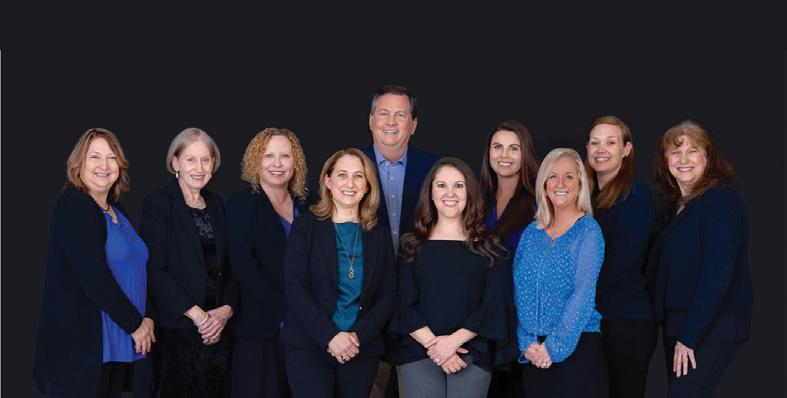


“When people ask about what inspires me, I no longer speak in terms of inspiration, but of being compelled.”
Mel ChinLissa Gotwals
Ihear a voice and look up. The face is much older, the voice deeper. But both are so familiar.
“Hey, Coach,” says Peter Gay, giving me what I used to call his “sly fastball grin.”
I stand up and we hug.
“You grew up, buddy.”
“And you grew old, Coach.”
“Funny how that happens.”
We both laugh.
Forty years ago, Pete and his brothers, Fred and Rodney, and their friend, Alvin, were the invincible infield of an inner-city baseball team I coached for two spring seasons called the Highland Park Orioles. I nicknamed them the Birds of Paradise because most of the players came from a tough innercity neighborhood where, by agreement with their anxious parents and guardians, I dropped them off near a street named Paradise after every practice and game.
Atlanta, in those years, was anything but a paradise. Due to the infamous “Missing and Murdered” crisis that besieged the city between 1979 and 1981, in which 30 Black kids and young adults were abducted and murdered by an unknown person or persons, the city that declared itself “too busy to hate” earned the distinction of being the “Murder Capital of America” for several years running.
In the spring of 1982, I was a senior writer for the Atlanta Journal-Constitution Sunday Magazine, the oldest Sunday magazine in the nation. During my six years there, I’d written about everything from unrepentant Klansmen to corrupt politicians, presidential campaigns to repo kings, a constant stream of violence and social mayhem. While working on a story about Atlanta’s famed medical examiner, Dr. Robert
Stivers (who was reportedly the inspiration for the late-1970s TV drama Quincy) I actually saw my next-door neighbor, a med student, gunned down in his backyard by an assailant. The young man died as his hysterical girlfriend and I waited for the EMTs and cops to arrive. The cops took their own sweet time, shrugging it off as just another drug deal gone sideways. I followed the ambulance hauling my neighbor’s body downtown to the ME’s office to await his autopsy. Talk about art imitating life’s worst moments.
I decided that I was becoming a career burn-out case. I’d had enough of covering the sorrows of my native South. But my editor — a charming true-blue Atlantan named Andy Sparks — had spotted my brewing crisis. He suggested I write about “lighter” subjects for a time.
So I went over to a rutted ball field with pen and pad, planning to write a sweet little feature story about the hopefulness of spring baseball tryouts in my Midtown neighborhood. Instead, I ended up getting strong-armed by the league director to take on a wild bunch of Orioles whose coach never bothered to show up. Looking back, it was one of the most fortunate things that ever happened to me.
Our first practice was chaos. The team horsed around and barely paid attention as I placed them into tentative playing positions. But somehow, I got the four best players into key spots. Pete and Alvin would rotate between pitching and playing third; Fred was on first base, and Rodney was catching.
On our way home, I stopped at a popular neighborhood joint called Woody’s just two blocks from the ball field, foolishly thinking that if I bought them a milkshake and got to know them better, the four best players on the team might help me whip the Birds into shape. Instead, they hooted and

hollered and made such a ruckus that the owners tossed us out and warned us not to return unless we learned to behave.
“I remember how you gave us a lecture about being gentlemen in public places,” Pete says as we sit together at Woody’s 40 years later. (Its milkshakes and steak-and-cheese sandwiches are better than ever.)
Peter Gay is 53 today, a hard-working father of three grown children, and a popular volunteer football coach and recruiter for Booker T. Washington High in the center city. He’s dressed in the bright blue colors of the Washington Bulldogs. Two years ago, he’d called me out of the Bulldog blue.
“I remembered the story you wrote for the Reader’s Digest about us,” he explained on the phone that afternoon. “And I remembered that you left Atlanta to write books. That’s how I found you on the Internet.”
“Tell me,” I’d said. “Is Woody’s still there?”

A day later, Pete sent me a photo of himself in front of the Woody’s sign. We made a plan to meet there when I came to Atlanta for my latest book research.
That first season, the Birds of Paradise never lost a game. Or if we did, I don’t recall it. We often won by football scores. Pete had a lethal fast ball. Alvin’s curve was unhittable. Rodney was an awesome catcher and Fred played first base like a pro. Even better, the Birds calmed down and became true gentlemen, on and off the field. (Though I spent a small fortune at Woody’s once the other members of the team learned about my gambit and got in on the post-game treat.)
“You kind of bribed us to behave with milkshakes,” says Pete today. “But I get that now. It really worked.”
Because of the Birds, I stayed for one more spring in Atlanta. In year two we went undefeated. A coach from the allwhite northern suburbs even proposed a “Metro” championship game at his team’s immaculate facility north of the city. We set a date for the game, and I went out and purchased new orange jerseys with my own money. A few days before the match-up, however, my opposing coach called back to say that some of his parents were concerned that my kids might feel “intimidated about playing in such a nice facility.”
I assured him the Birds wouldn’t be intimidated. We both knew the meaning of his code words.
“Well,” he said uneasily, “maybe… next year.”



There was no next year.
After the season, the owners of Woody’s threw us a party and I left Atlanta for Vermont. There, I learned to fly fish, knocked the rust off my golf game and found a whole new career writing about people and subjects that enrich life.
I realized that the Birds of Paradise gave me a gift those two years: a healing glimpse of what real happiness is like.
As another spring dawns, I’ve seen Pete and Fred several times and even attended the beautiful wedding of Pete’s daughter, Petera, last summer. Very soon, on my next trip to Atlanta, I’m planning to take my entire infield to a nice, grown-up dinner, with or without milkshakes.









CHANGE OF HEART



It Takes Courage Malik’s Dream Comes True
CAUGHT ON CAMERA! Leaked Photos from the Governor’s Mansion

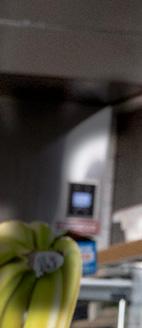
Look! Up in the Sky! Fear over the Fairway

Donut Worry! Unexpected Loss at Krispy Kreme

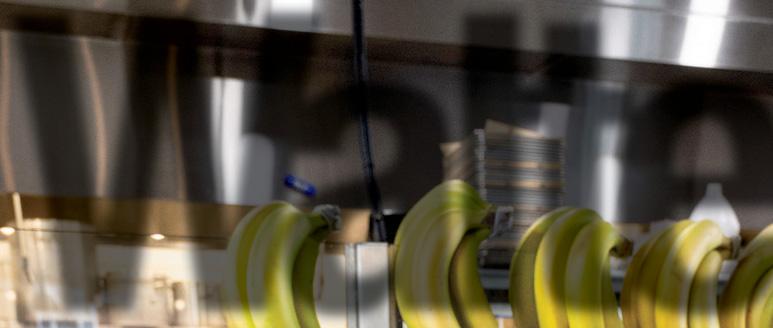


— Leaked photos from
the North Carolina Executive Mansion reveal that Gov. Roy Cooper and his wife, Kristin Cooper, are secret Duke University sports fans.


Gov. Cooper got both his undergraduate degree and law degree from the University of North Carolina at Chapel Hill, and the couple’s three daughters all graduated from UNC as well. Gov. and Mrs. Cooper are often seen seated courtside at the Tar Heels’ basketball games wearing signature Carolina blue.

“They’re faking it,” says a source. “All that Tar Heel gear? It’s just a costume.” The source, who requested to remain anonymous, says that the governor and his wife have a “secret stash” of Blue Devils jerseys, socks and other gear that they wear when they think no one is around.


But photographic proof came to light in late March, when a staffer forgot their phone in a Lyft. “When I pulled up the home screen to figure out who might have left the phone, the home screen clearly showed the governor looking way too chummy with Dereck Lively II, Jeremy Roach and Kyle Filipowski,” says the driver, who requested anonymity. “I took that phone straight to the Raleigh Police Department.”
Raleigh police were able to crack the phone to reveal the incriminating photos of the Coopers. Among them: the governor reviewing materials in a Duke-blue tie with matching socks; the governor in a meeting with a Duke basketball proudly
resting on the table behind him; and the governor and first lady strolling on the grounds of the Executive Mansion in full Duke attire. An RPD spokesperson declined to comment on the images, citing an ongoing investigation.
Another source inside the Executive Mansion says the cracks were beginning to show as early as last fall. In September, Gov. Cooper honored the recently retired Duke basketball coach Mike Krzyzewski with the Order of the Longleaf Pine, North Carolina’s highest civilian honor. The governor wore a dark blue tie and outfitted the family dog, Violet, in a Duke collar. “They acted like those were new, but they already had them,” says the source. “If you look really closely, there are signs of wear.” The source also notes a key quote from Coach K during the ceremony: “He looked at the cameras and said, Gov. Cooper is a Duke fan today, but people who were there know that the footage cuts out before he narrowed his eyes and said, and every day.”


When asked for comment, deputy communications director Jordan Monaghan downplayed the accusations and urged reporters to focus on issues like raising teacher pay, investing in the state’s strong and diverse workforce, and protecting reproductive rights.


When shown the photos, The News & Observer sports photographer Robert Willett said they looked authentic. He shook his head in dismay: “What’s next, he’s not even a Canes fan?” WW

“No comment.”
– First Lady Kristin Cooper
SAY IT AIN’T SO!

Kathleen Malik, who along with her husband, Steve, is majority owner of the North Carolina Football Club, will suit up for the NC Courage soccer game this weekend. “It’s always been a dream of mine to play alongside these incredible athletes, but I never realized it was possible until Ryan Reynolds announced he’d be playing for Wrexham,” she says. While she’s been training for a while, Malik’s realistic: “I expect to spend a lot of time on the bench.”

Golfers at Prestonwood Country Club got a shock Thursday afternoon when a large, low-flying balloon was spotted over the ninth hole. “It came out of nowhere, and it was huge,” says Simone Hayward, who was on the putting green at the time. Cary police were fast onto the scene and shot the balloon down over the lake. Preliminary investigations indicate that the balloon was commissioned by a New York City real estate company.

The Raleigh Rezoning Commission adjourned abruptly after an altercation broke out over the renaming of the Midtown area. Advocates of the Wegtown moniker, favored by lower Midtown residents, clashed with Kaneberg supporters, most of whom live in upper Midtown. The discussion will resume next month.

In an effort to provide more clean energy for Raleigh’s growing population, a number of historic mills and dams will be recommissioned to accommodate hydroelectric generators. Lassiter Mill in North Hills, Yates Mill off Lake Wheeler Road, the Company Mill in Umstead State Park and the Milburnie Dam on the Neuse River are among those slated for use.


Sources say a scathing new book is in the works from David Meeker, the son of lawyer and longtime mayor Charles Meeker. The book is expected to offer a raw, unflinching look at the pressures of growing up in the shadow Raleigh political “royalty.” “David’s on all these boards and has done a ton for Raleigh — but because he’s not a politician, it’s just never been enough,” says a friend who asked to remain anonymous.
ThomasSayre, the artist best known for the iconic Gyre sculpture on the grounds of the NCMA, has unveiled his newest piece. The earthcast installation is in the form of a to-scale construction tower crane and will be permanently installed near The Village District in an area previously slated for condominium development. “Over time, native plants will take over the space. It’s a commentary on the interplay between civilization and nature,” Sayre says. A second sculpture, earthcast from scaffolding, will come in the next few months.


For the fourth time this year, Wake County Public Schools have redrawn the maps, sparking frustration among parents. The latest plan buses students in Raleigh and Cary’s downtowns to the furthest outskirts of the county. “These city kids don’t know anything about agriculture — this is the best thing we can do for their education,” said outgoing superintendent Cathy Moore. The move is expected to affect thousands of families, who will have to adjust to new bus schedules, longer commute times and wide-open spaces.

Raleigh is finally getting what many long believed was missing: a waterfront. This week, the city council approved plans to dig up portions of West and South Saunders Streets to widen and connect the Pigeon House Branch creek all the way from Crabtree Creek to Rocky Branch. The extension will run under the train tracks near Union Station, with a pedestrian bridge providing safe passage and a new vantage point of the city skyline.



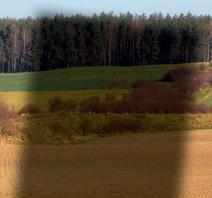

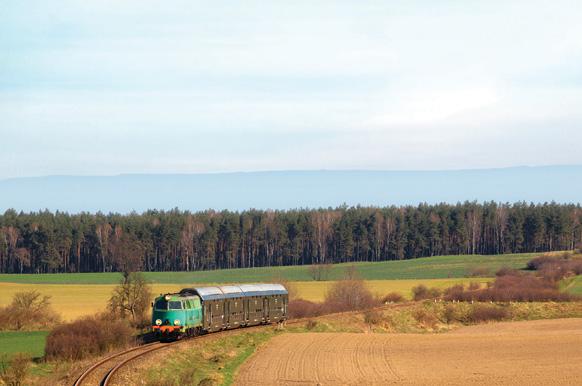


At long last, Tír na nÓg will return to downtown. The beloved Irish tavern occupied the cavernous space on S. Blount Street that’s now Brewery Bhavana for nearly two decades before closing in 2016. While owner Annie Britton-Nice would not confirm the new location, sources have noticed new bucolic murals being painted inside the former Royale space across from Moore Square.

In a bizarre incident, a group of rogue squirrels reportedly stole a large batch of Krispy Kreme donuts from a delivery truck parked outside the Person Street location. Eyewitnesses described the scene as chaotic and comical, as the squirrels descended en masse, then scampered off with dozens of donuts in their tiny paws. “It was like something out of a cartoon,” said one witness. Police were called to the scene but were unable to apprehend the gang, which had already scattered into the surrounding trees and bushes. In a statement, an RPD spokesperson said that identifying the suspects would be nearly impossible: “All squirrels look alike, and they’re really hard to catch.” The theft has sparked fear among bakery owners across the city; some, like Union Special Bread and lucettegrace, have started hiring guards armed with stun guns to help protect their precious cargo. “Donuts are one thing, but it would take us weeks to recover if those rodents came after our croissants,” says Andrew Ullom, owner of Union Special. WW

In a surprising move, Longleaf Swine BBQ, one of Raleigh’s most celebrated barbecue joints, has announced that it will be switching to a 100% vegan menu, replacing its signature whole-hog offerings with plant-based “pork” made from banana peels.


“This is not a decision we’ve made lightly, but it just feels right,” says chef and co-owner Marc Russell, citing a recent deep-dive into books about sustainability and the health benefits of a plant-based diet.
“At first, Adam was resistant, but after I sent him a bunch of research, he started to change his mind.”


have a great depth of flavor, and they’re fibrous enough to give you the bite you’d expect from a pulled pork,” says Russell.
Cunningham himself was impressed by the authenticity of the new product: “Marc knocked it out of the park — like I knew he would. Seriously, you won’t be missing anything.”

In addition to the Whole Banana BBQ, the updated menu will include Portobello Ribs, Jackfruit Brisket and ingredient swaps like vegan cheese on its popular Pimento Mac & Cheese and Esquites. “Our mission is, and will always be, to serve the highest quality North Carolina-style barbecue to our customers,” says co-owner Adam Cunningham
Russell has been working around the clock to perfect the recipes, testing dozens of fruits and vegetables to find ones that could stand up to cooking in the restaurant’s giant smoker and would pair with their sauce offerings. “Banana peels
As part of the switch, the restaurant will change its name to Longleaf Vine BBQ, and customers will see new signage and merch in the coming weeks to advertise its vegan offerings. Co-owner Ben Davis will also be investing in an all-solar, hydroponic banana farm in Fuquay-Varina to support the restaurant. “Sourcing local is so important to us, and if this takes off like I think it will, we’re gonna need a lot more bananas,” Davis says.


Most area barbecue pros have rallied around the Longleaf team, even if they are not planning to make the switch themselves. “For me, pork will always be central to the way I do Carolina barbecue, but if anyone can do it, these guys can,” says Southern Smoke BBQ pitmaster Matthew Register. Lawrence Barbecue pitmaster Jake Wood says he wishes them well: “I get people asking
about vegan options all the time, so maybe Marc and Adam will create some new traditions in Southern cooking.” But another local pitmaster, who asked to remain anonymous, isn’t convinced: “It’s un-North Carolinian! If it ain’t whole hog, it ain’t barbecue.”
One benefit, the Longleaf team said, is that the new vegetable-based products take a fraction of the time to cook as the previous meat products. Cunningham has used that time to brush up on the cello, and Russell doesn’t miss the late nights and early mornings manning the smoker. “I’m sleeping more than I ever have,” says Russell. “Everyone around me keeps joking that I’m glowing.” WW
“It’s un-North Carolinian! If it ain’t whole hog, it ain’t barbecue.”
After a long-awaited opening, the restaurant pivots again
Bananas are just the beginning! Russell’s testing out all kinds of new veggies in the smoker.


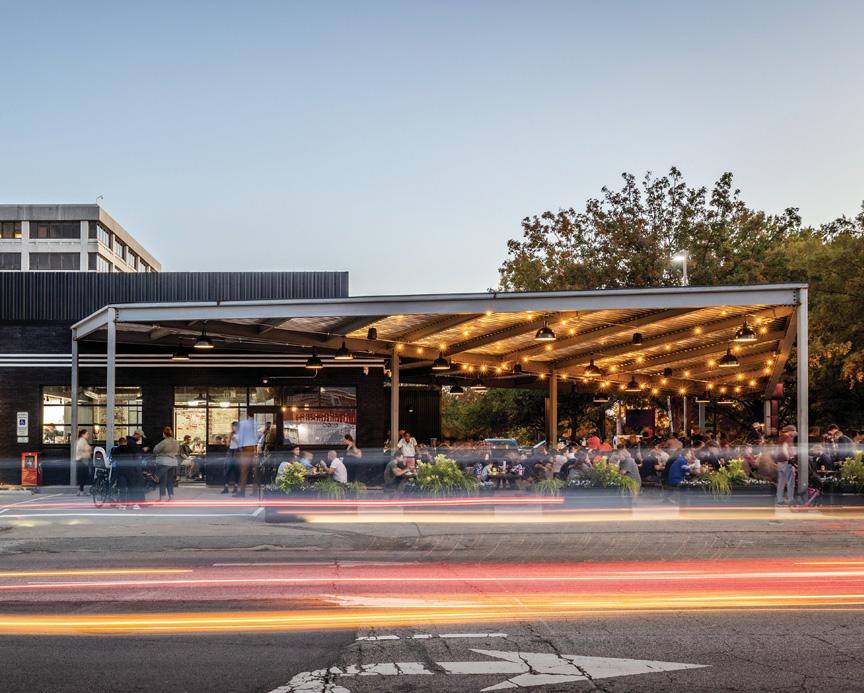





That’s not from Centro! Angela Salamanca sneaks a bite of a Crunchwrap.







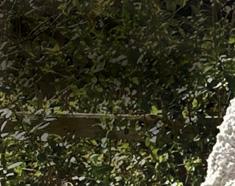





Actor and director Ira David Wood III won’t let a little weather spoil his well-deserved beach time.





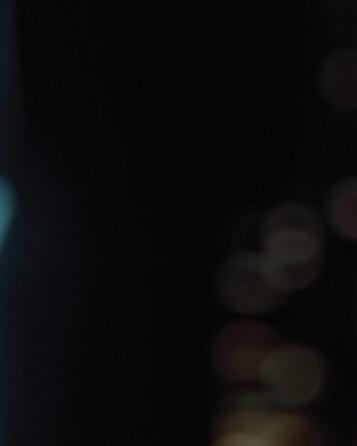





















Wednesday, May 24


6-9PM | Weymouth Center for the Arts and Humanities
Join PineStraw for this special farm-to-table dinner. Savor a collaborative 3-course menu from chef Mark Elliott of Elliott’s On Linden in Pinehurst and chef Saif Rahman of Vidrio in Raleigh. This exclusive collaboration will highlight sustainability, local farms and ingredients.
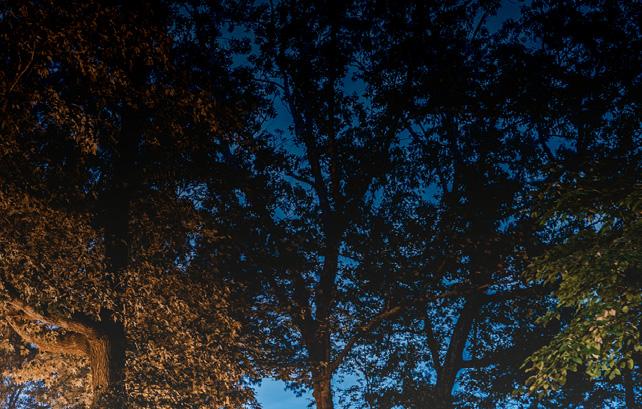
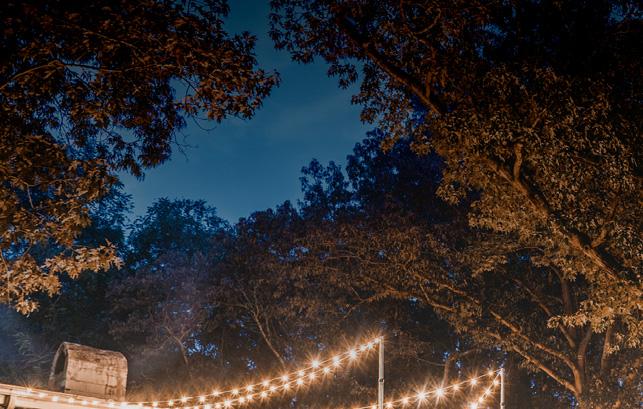
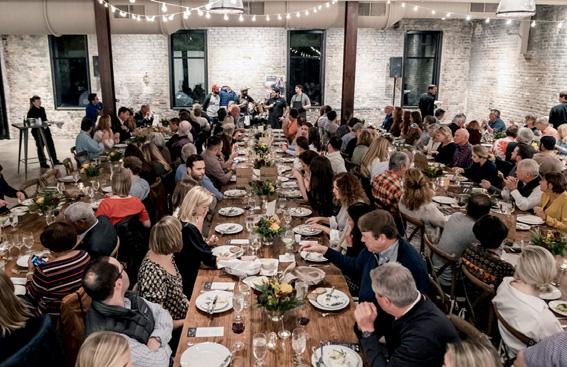


Ticket includes wine and beer pairings, hors d’oeuvres and a 3-course dinner.

PRESENTED BYSUPPORTED BY SCAN HERE FOR TICKETS, OR VISIT: PINESTRAWMAG.COM/SAVETHEDATE




The woman has a gold stud through her tongue, her companion a snarling tiger tattooed on his neck. They hover over cups of Crazy Vanilla and Chunky Chocolate as she describes the final scene from an old Tom Hanks movie in which a single white feather is lifted on a breeze to float gently through the universe. “It’s symbolic of death and rebirth,” she says, and claims the movie’s protagonist is dying as he sits on a bench pondering his young son’s passage into tomorrow. The woman with the studded tongue says the feather’s random motion is evocative of fate and free will and that we are all reborn with our final breath, our souls gently ascending. The man with the tiger tattoo sees it differently: “Sometimes,” he says, “you’re just full of it.” And there, in the sumptuous clamor of the ice cream parlor, you become aware of a cold certainty that has nothing to do with feathers or movies or tattoos or tasty confections or the clear blue sky or the universe about which the stud-tongued woman is so emphatic on this spring morning when you are again reminded that for every bright romantic notion there’s a spiteful truth that will crush it.
Stephen Smith’s Beguiled by the Frailties of Those Who Precede Us will be published this spring by Kelsay Books.


Designer Martha Schneider of La Maison Atelier pulled inspiration for this apartment’s living room from two images from photographer Tess Atkinson’s Dogwood Series on the wall. The living area opens to the dining area, which continues on to a balcony.

Springy colors welcome empty nesters to North Carolina
 by AYN-MONIQUE KLAHRE
by AYN-MONIQUE KLAHRE
photography by CATHERINE
NGUYENTThe tone is set just as you cross the threshold: above a petite demilune table, there’s a photograph of a woman clad in flowing, lemon-yellow chiffon. It’s a hue that weaves itself through the apartment, and the spirit of the art was the jumping-off point for designer Martha Schneider of La Maison Atelier. “I love that yellow,” she says. “And it’s just a simple, gorgeous photograph.”

Schneider designed this space in The Carolinian on Glenwood Avenue as a home for recent empty-nesters. They’d just sent the last of their three children to college, and were also new North Carolinians, having moved South after living in the Boston area. The couple wanted a space to suit both this new stage of life and their downsized square footage. So it’s well-appointed but unfussy, done in a mix of traditional styling and more modern pieces. “That’s sort of my style, a transitional look that blends the old and the new,” says Schneider.
While most of the furnishings were
purchased for the apartment, the art came from the homeowners’ collection, much of it found at Jules Place Art & Consulting in Boston. Schneider pulled the color scheme from two Tess Atkinson photographs of dogwood trees that are hanging in the living room. “The wife said, if this can be an inspiration, let’s go for it!” laughs Schneider. So Schneider worked in furnishings in grays and whites, with punches of black or gold here and there for contrast. She varied the materials throughout — from a soft velvet on the living room accent chairs to a buttery faux leather in the dining room seating — for contrast and interest. “I always do a mix of textures,” she says.
The narrow palette also helped the open-plan living and dining areas, which continue on to a patio and the kitchen, to work both together and as separate spaces. The couple loves to entertain — “And made a lot of friends really fast!” says Schneider — so flexibility and plenty of seating were musts.
An open settee between the living and dining areas, for example, can be used in either space, and the pair of curvy brass coffee tables can be easily shifted to make it easier to grab an appetizer.

In the two bedrooms, watercolor hues soften up the neutral colors. The guest room, which is most used by their youngest daughter, plays on the wife and daughter’s love of fashion. “It’s a real passion point,” says Schneider. She wove the theme in through art — like the sculptural Ribbon by Angela Chrusciaki Blehm above the bed’s chenille headboard — as well as garment-inspired textures, like bedside lamps with pom-pom-esque details, and a satin and faux-fur accent pillow. The primary bedroom pulls in lavender tones and a bold floral photography and mixed-media archival print by Christy Lee Rogers.
Schneider wove it all together to create a classic, welcoming space for this couple to start their new stage of life in their new home state.
Opposite page: A large fashion photograph in a gold frame hangs in the entryway, setting the tone for the apartment. Schneider accessorized with items from her retail store, La Maison in North Hills. The light gray velvet chairs are from Mr. Brown London. This page: In the dining area, a blue velvet banquette and faux-leather upholstered chairs offer a comfortable place to linger around the tulip table.

The guest bedroom is done in pretty pastels, a nod to the taste of the couple’s youngest daughter, who recently left for college. It plays up a love of fashion through art: a black-and-white magazine photograph, the sculpture of a length of ribbon by Angela Chrusciaki Blehm and an abstracted portrait of a Chanel perfume bottle by Mark Andrews. Opposite page: In the primary bedroom, an archival pigment print by Christy Lee Rogers sets the visual theme for the room.






By early April, they make their debut: a symphony of blossoms in shades of red, purple, orange, white and pink, lush against green leaves. In a season where balmy days jostle with the last frosty nights, azaleas are a welcome sight, a harbinger of the lush months to come. And at the WRAL Azalea Gardens, they’re on full, glorious display.
The gardens are located on Capitol Broadcasting Company’s campus off Western Boulevard. They were established in 1959 by the station’s founder, A.J. Fletcher, as a gift to the people of Raleigh. Fletcher, a lover of azaleas, oversaw the planting of the first 1,000 bushes. Today, many of those plants are still blooming — thousands of blossoms over more than three acres. Signage details the different varieties of azaleas, the names as diverse as the coloration: Formosa, President Clay, Mrs. G. G. Gerbing, Pink Perfect. The gardens are shaded by Loblolly and Shortleaf pines, and whimsical sculptures are tucked into paths that meander and intersect.
Property manager Rodney Collier oversees the grounds of the gardens, along with other CBC properties. “We take a lot of time and effort to keep them alive and healthy; it’s our way of giving back to the community,” Collier says, noting that he sees many of the same people come to visit year after year. The garden offers a quiet respite in all four seasons, but the crowds are biggest in spring — it’s particularly popular for weddings and photos. “Last season, we had a couple of hundred people here in prom dresses!” Collier says.
Collier and his team work year-round to maintain the gardens. “Azaleas are a high-maintenance plant — you have to stay on top of them,” says Collier. Over time, they’ve planted more and more Encore azaleas, which bloom twice a year. (These also have fun names, like Starburst, Sangria and Debutante.) In addition, the garden showcases a range of other flowering trees, bushes and perennials, plus annuals they swap a few times a year. “It’s always different, we use a lot of lantana because it’s really hardy summer blooming, but we’ll put in pansies for winter and tulips for springtime, and we change up the colors from year to year,” Collier says.

Over the next few months, visitors will notice a new patio for weddings, updated signage, expanded grassy areas and more accessible hardscape paths. “But the garden will be open the whole time,” Collier says.
At the entrance to the garden, a fountain murmurs and a small plaque offers a poem, “God’s Garden” by 19th-century English poet Dorothy Gurney: The kiss of the sun for pardon / The song of the birds for mirth / One is nearer God’s heart in a garden / Than anywhere else on earth. Wander the paths on a spring afternoon, and you’re bound to agree.




God’s Garden
by Dorothy GurneyThe kiss of the sun for pardon
The song of the birds for mirth
One is nearer God’s heart in a garden

Than anywhere else on earth
From A Little Book of Quiet (1913)
A mix of hardscape and gravel paths meander through the WRAL Azalea Gardens, with seating at intervals. Shaded by pine and maple trees, it’s surprisingly peaceful within its urban setting.


The gardens host dozens of varieties of traditional and Encore azaleas, as well as other plants including rhododendrons, primrose, dogwood, Japanese maple, fig, buckeye, hydrangea and hibiscus.






In his encore career, Ed Baxter fuses two lifelong passions ART

For Ed Baxter, jazz and art have been constants throughout every phase of his life. They offered comfort in childhood and wartime, then a relaxing outlet through his adult life. Today, these two passions fuse together in Baxter’s encore career as a professional artist.
Baxter was born in Raleigh’s Saint Agnes Hospital in 1947. Jazz infuses his earliest childhood memories of sitting by the radio with an intent ear, listening to the sounds of Louis Armstrong. He often had paper and pencils nearby, sketching Mickey Mouse and Thunderbirds. When Baxter was around 10 years old, those voices began to appear as faces on television. “I’ll never forget when I started seeing jazz musicians like Armstrong and Nat King Cole. It was a big deal because they were Black,” Baxter recalls. “Every-
one in the house would stop what they were doing to watch.”
An art teacher named Mrs. Bullock at J.W. Junior-Senior Ligon High School (now Ligon Magnet Middle School) introduced him to oil paints. “I’ve loved them ever since — the smell, the look, the feel, the stroke,” he says.

Baxter brought albums and art supplies to Turkey in 1967, where he served for 16 months in the military; he played them on a turntable purchased at the Army exchange store. There, friends introduced him to more progressive jazz like Miles Davis and John Coltrane. “I loved Duke Ellington and Count Basie and Sinatra. But learning about these guys just
opened me up to even more,” he says. He still has those albums.
Baxter’s two passions stayed with him over a 30-year career with the post office and as he and his wife, Carolyn, raised their children, Felicia and Ron.
“I thought all dads were eccentric and painted after work while listening to jazz,” says Ron, who is now a jazz musician in Raleigh. Baxter hoped to turn his hobby into more, but, he says,“in the 60s and 70s, there was nowhere for Black artists to exhibit their art.”
When Raleigh’s Visual Art Exchange (VAE) was formed in 1980, Baxter asked then-director Sarah Powers if he could exhibit. She agreed. His two 24-by-48-
“Jazz singers and musicians improvise, just like artists do — just like I do. They’re the same abstracts.”
— Ed Baxter

inch pictures of jazz musicians — one playing the saxophone, the other a bass — sold immediately, each for $950. “That was a happy day for me,” he says.
Baxter retired from the post office in 2006, and committed to working as an artist fulltime. He applied to juried art shows, many of which he was accepted to. He built a studio behind his West Raleigh home, which has shelves packed with albums, CDs, art supplies and mementos.

Baxter can paint pretty much any style, but his signature work depicts stylized Black musicians, dancers and athletes. Movement and sound come to the forefront through bold colors and contrasting textures. Baxter filters reality into the image on canvas. “It’s always from my imagination,” he says.
In one painting, a woman sits on a chair, playing the cello. But the instrument isn’t depicted in wood tones: its body is iridescent aqua and purple, the fingerboard a bright blue. Baxter captures her focus, the movement in her positioning; the background and her clothing are blocked in gold, teal and orange. “Jazz singers and musicians improvise, just like artists do — just like I do,” he says. “They’re the same abstracts.”
Now, Baxter’s work has been displayed all over the country. Locally, he’s exhibited at the North Carolina Museum of Art, Contemporary Art Museum, Dorothea Dix Park and dozens of other galleries. He’s had solo shows at the Sertoma Art Center, Pullen Art Center and Triangle Cultural Art Gallery.
A spiritual man, Baxter considers
some of his most meaningful work to be a recent commission from the Virginia Theological Seminary. A celebration this fall will honor the seminary’s bicentennial, and it includes an initiative to acknowledge and make amends for the fact that the institution was built by slaves. The seminary commissioned Baxter to paint two pieces: Sin shows a row of slaves in a cotton field with a white man holding a whip, while Grace shows a peaceful Black ballerina soaring over a blue-and-red backdrop.
“The fact that they’ll be there permanently means something,” says Baxter. Because more than anything, Baxter wants the viewer to feel his art, not just see it — to hear the music of the man playing the saxophone, experience the grace of the ballerina or feel the injustice of slavery. “I always pray for my work to be seen,” he says. “I don’t pray for fame but for my work to be seen all over the world and to mean something.”
“I don’t pray for fame but for my work to be seen all over the world and to mean something.”
— Ed Baxter






For tickets and sponsorship information for the 2023 NC Media & Journalism Hall of Fame Gala on April 21, please visit nchof.mj.unc.edu. To support the Hall of Fame, please scan the QR code.

The NC Media and Journalism Hall of Fame celebrates those with ties to the state of North Carolina who impact, inspire and advance the professions and communities they serve in the fields of media and journalism.
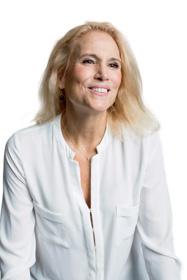

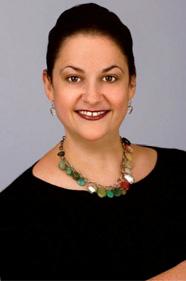
 ROBERT J. BROWN
CURRY KIRKPATRICK
DAVID CRABTREE
JANET NORTHEN JJ MILLER
KENNY SMITH
ROBERT J. BROWN
CURRY KIRKPATRICK
DAVID CRABTREE
JANET NORTHEN JJ MILLER
KENNY SMITH










Paul Coggins and Glen Medders showcased their home and art collection to the men of CAM's private art collectors group on Feb. 9. Overlooking the vibrant Raleigh skyline, art enthusiasts enjoyed a meet-and-greet with each other, as well as with Dr. Paul Baker, the executive director of CAM, and Raj Bunnag, the museum’s curator of exhibitions.
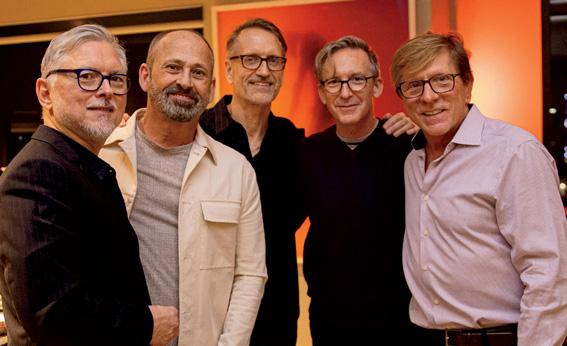
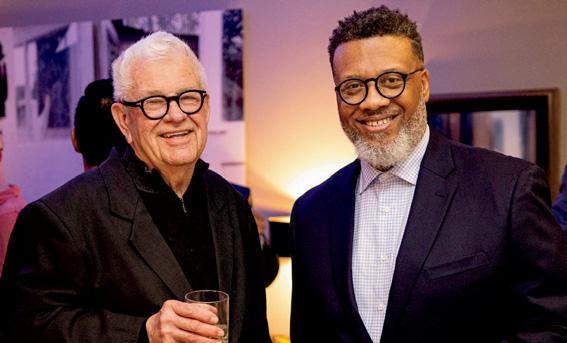













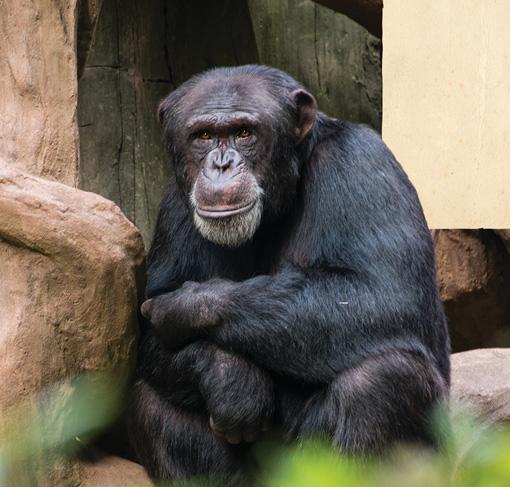
On Feb. 24, Roanoke to Raleigh hosted an event at All Saints Chapel to celebrate a new version of The Lost Colony, America’s oldest outdoor drama. The Roanoke Island Historical Association used down time in 2020 to visualize a more inclusive version of the production, which now includes a partnership with the Lumbee tribe.






On Jan. 28, the Evening to Dream gala celebrated its 25th anniversary. The gala, which benefits Methodist Home for Children, honored new members of its Guardian Angel Society for their gifts of time and resources. This year’s Guardian Angels are Julie Murphy, Marnie and Jerod Cohen, Mary June and Henry Jones, and Marcus and Clarissa Green.





Sunday, April 2 & April 30 • 11:30 - 2 pm
“Come Sunday” Jazz Series
April 2: Roland Barber, Trombonist; presented in partnership with UNCP
April 30: Kate McGarry and Keith Ganz Ensemble. Bring lawn chairs and a picnic. Cash bar available.
Members/Non-Members: $25/$35
Series Subscribers:
Members/Non-Members: $40/$60
Kids 12 and under: free
Sunday, April 16 • 2 pm
“A Forest Unfolding” w/The Country Bookshop
A fusion of music and literature exploring the relations among people and trees. Narrated by Richard Powers, author of Pulitzer Prize winning novel, The Overstory. $25 Members /$35 Non-Members
Sunday, Sunday,April 23 • 2 pm
Lumbee Life, Lore & Legacy
“Herbal Remedies of the Lumbee Indians.”
Speaker: Arvis Boughman, teacher & author.
Members: $15/ Non-Members: $20
Follow us on Facebook, where we will be posting a poem a day written by NC poets.
For tickets visit: weymouthcenter.org
To receive $5 off, use promo code: DTWA



On Mar. 2, Raleigh’s premier arts venue officially raised the curtain on its new name: Martin Marietta Center for the Performing Arts. Hosted in its grand lobby, the center honored the milestone by unveiling premier signage during a ceremony in front of city leaders, local officials and executive leadership.
Just a short drive away, there’s a perfect place to escape for the day.
Our 100-year-old historic house is a storied venue for events and programs that will spark your mind, and feed your senses. If you prefer, you are welcome to roam our 26 acres of gardens and grounds, or picnic on our lush lawns.

We’re conveniently nestled in the heart of Southern Pines, a quaint town, which boasts a host of restaurants and cute boutiques that also offer something for everyone.
So next time you have the urge to get out of town, put us on your GPS. You can experience a real getaway, but still get home in a single day.
555 E. Connecticut Ave., Southern Pines, NC • A 501(c)(3) organization

OAKWOOD SAMEDI GRAS













The neighborhood of Historic Oakwood held its Samedi Gras celebration on Feb. 18. This annual celebration features the crowning of its new King and Empress, performances from the Oakwood Second Line Band, New Orleans-themed food and drink, kids activities and a parade through the neighborhood.









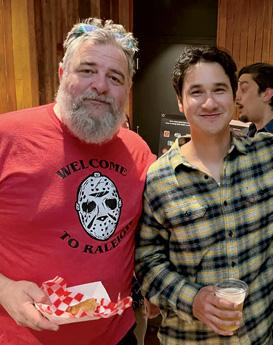




On Feb. 23, Raleigh-based video production agency Myriad hosted Adobe for an event to showcase its newest features. The evening gathered many creatives from the area to talk about how they work while they enjoyed snacks from food trucks, drinks at the bar, a demonstration of Adobe products and a performance from musician Sonny Miles.
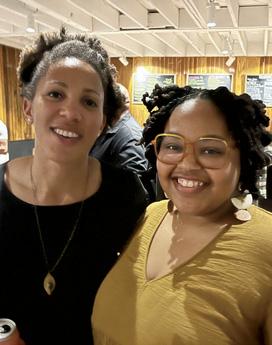
Take







She’s traveled the world teaching about wine and food — now she’s opened her own school in Raleigh. by Addie Ladner and Emma Deal



WALTER to go! There’s always something to discover on our website and social media.
It’s the first Sunday after the full moon following the spring equinox, when Southerners who celebrate the resurrection will do some reviving of their own — of the good china and the summer whites. Vases of lilies on dining room tables will spill into heirloom bowls of dyed eggs that match the sky for a sunrise Hallelujah.
From bunnies to bows, Easter brims with traditions, logic not being one of them. Here are seven staples of a Southern Easter.

1. The egg-laying bunny. It’s a perplexing science, the machinations of the Osterhase. We can blame the Germans, who brought the legendary rabbit into American tradition in the 1700s as a symbol of fertility. By the time the tulips are up, this bunny proliferates on tables, mantels and front porches — and on a pink bench at the mall, wideeyed and big-eared for a frightening little photo op.
2. Treat-filled baskets. By dawn on Easter Sunday, the children will discover their baskets. Cadbury eggs and fluffy stuffed bunnies sit in nests of crinkled-paper grass, sometimes accented with Peeps and bubble wands. There could even be a real bunny, twitching its nose in the hands of a parent who will surely regret it.
3. An Easter egg hunt. Dressed like little pilgrims in their collars and knee
socks, the children will grip their baskets for the countdown, then shoot off into the azaleas, prowling for flashes of neon. Jesus may be risen, but the pansies won’t be coming back from that stampede of saddle oxfords. It’s a centuries-old Eastertide festivity, with eggs symbolizing rebirth. Born of these eggs, however, will be jelly beans and Hershey’s Kisses, softened into a collarruining goop.
4. White shoes before Memorial Day. Donning one’s Easter best has been a thing since the times of bonnets, gloves
and satin ribbon. Those newly pressed dresses and suits turn the church courtyard into Southern Fashion Week — and render even relatives unrecognizable. (Is that Cousin Jane under the yellow fascinator?)
5. A hearty spread on a pastel tablescape. The dishes will be heavy with mayonnaise and irony (see: deviled eggs). Expect cheese (straws, pimento), brown-sugar glazed ham, cold broccoli salad, buttermilk drop biscuits and, historically, lamb (a sacrifice as ironic as the name Good Friday). Slide the carrot cake over to that uncle who gave up dessert for Lent.
6. Another egg hunt. Oh, you thought you were finished? There will be egg hunts at school, at birthday parties and on every stretch of green from the golf course to your neighbor’s narrow side-yard — so many hunts that you think surely the children will succumb to apathy. They will not. There will be egg hunts even in your dreams, full of frenzy, candy and an occasional busted lip.
7. One breathtaking moment at church. When I watch my children stand and run their fingers along the hymnal under the lyrics of Welcome, Happy Morning!, I remember that beneath the bows and frills and chocolate-stained fingers lies the enormity of what the holiday actually celebrates: the renewal of hope.

Med Children’s, we love what At WakeM most as much as who we do it we do al s why, at the communit y’s only for. That’s hospital, you’ll find all sorts of children’s specialties, all under one roof. pediatric s, surgeons, nurses, techs and Physicians
pecialists, all pediatric-trained su upp p or t s




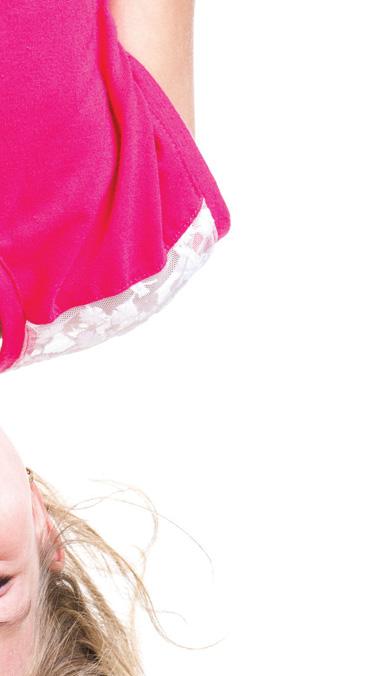

tient care, outpatient care and And inpat c y care designed just for kids. emergen d by hundreds of experts, all of Delivere roughly dedicated to a happy, them tho hildhood for ever y one of our healthy c arn more, visit us online today. kids. To le